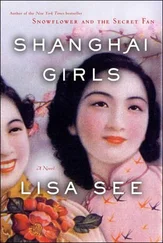Lisa See - Peony in Love
Здесь есть возможность читать онлайн «Lisa See - Peony in Love» весь текст электронной книги совершенно бесплатно (целиком полную версию без сокращений). В некоторых случаях можно слушать аудио, скачать через торрент в формате fb2 и присутствует краткое содержание. Жанр: Старинная литература, на английском языке. Описание произведения, (предисловие) а так же отзывы посетителей доступны на портале библиотеки ЛибКат.
- Название:Peony in Love
- Автор:
- Жанр:
- Год:неизвестен
- ISBN:нет данных
- Рейтинг книги:4 / 5. Голосов: 1
-
Избранное:Добавить в избранное
- Отзывы:
-
Ваша оценка:
- 80
- 1
- 2
- 3
- 4
- 5
Peony in Love: краткое содержание, описание и аннотация
Предлагаем к чтению аннотацию, описание, краткое содержание или предисловие (зависит от того, что написал сам автор книги «Peony in Love»). Если вы не нашли необходимую информацию о книге — напишите в комментариях, мы постараемся отыскать её.
Peony in Love — читать онлайн бесплатно полную книгу (весь текст) целиком
Ниже представлен текст книги, разбитый по страницам. Система сохранения места последней прочитанной страницы, позволяет с удобством читать онлайн бесплатно книгу «Peony in Love», без необходимости каждый раз заново искать на чём Вы остановились. Поставьте закладку, и сможете в любой момент перейти на страницу, на которой закончили чтение.
Интервал:
Закладка:
“He wanted to impress everyone with his love of the arts, but every inch of his journey cost the people of the country an inch of silver,” Li Shu complained. “The route on which he traveled was paved in imperial yellow. The walls and stone balustrades where he walked were carved with dragons.”
“The emperor held a pageant,” Hong Zhize added. I was pleased to see that Hong Sheng’s daughter had grown into a beautiful and accomplished poet in her own right. “He galloped on horseback across the field, shoot-ing arrows. Each one met its mark. Even when the horse bolted, the emperor still hit the target. This stirred something in my husband. That night, my husband’s arrows met their target too.”
This inspired other women to confide that the emperor’s manly ex-ploits had changed their husbands also.
“Don’t be surprised if there isn’t a flurry of one-month parties ten months from now,” one of the women said, and the others agreed.
( 2 4 7 )
Li Shu held up her hands to stop the laughter. She leaned forward, lowered her voice, and confided, “The emperor says this is the beginning of a prosperous age, but I’m worried. He’s very much against The Peony Pavilion. He says it’s a debaucher of girls and puts too much emphasis on qing. The moralists have grabbed hold of this and are stinking up the streets with their added manure.”
The women tried to cheer each other up with brave words, but their voices quavered with uncertainty. What had started as a comment here or there from one husband or another was now becoming imperial policy.
“I say no one can stop us from reading The Peony Pavilion or anything else,” Li Shu said, with a conviction that no one believed.
“But for how long?” Yi asked plaintively. “I haven’t even read it yet.”
“You will.” Ren stood at the door. He strode across the room, took his son from his wife, held him aloft for a moment, and then brought him back down to nestle in the crook of his arm. “You’ve worked long and hard to read and understand the things I love,” he said, “and now you’ve given me a son. How could I not want to share with you something that means so much to me?”
( 2 4 8 )

The Clouds Hall
r e n ’s wo r d s r eawake n e d my d e s i r e to f i n i s h my project, but I wasn’t quite ready and neither was Yi. It had been fifteen years since I’d looked at the opera. During that time, I thought I’d harnessed my harmful qualities, but with the new baby in the house I had to be sure. Also, Yi needed to study more before she would understand The Peony Pavilion. I engaged Li Shu, Ren, and Madame Wu to help me prepare my sister-wife. Then, after another two years, during which I cared for the family without incident, I finally allowed my husband to give Yi the volume of The Peony Pavilion that Ze and I had worked on.
Every morning after Yi dressed, she went to the garden to pick a peony.
Then she stopped by the kitchen for a fresh peach, a bowl of cherries, or a melon. After leaving instructions for the cook, she took her offerings to the ancestral hall. She first lit incense and made obeisance to the Wu ancestors, and then she laid her piece of fruit before Ze’s ancestor tablet.
Once these duties were done, she went to the room where my dummy bride resided and set the peony in a vase. She spoke to the ancestor tablet buried inside the dummy about her hopes for her son and her need for her husband and mother-in-law to remain healthy.
Then we’d go to the Moon-Viewing Pavilion, where Yi opened The Peony Pavilion and looked at all the notes about love that had been written in the margins. She read late into the afternoons—her hair hanging loose down her back, her gown flowing around her, her face set in a small frown ( 2 4 9 )
as she contemplated this or that passage. At other times she’d pause on a line, close her eyes, and hold perfectly still as she transported herself deeper into the story. I remembered that when I’d seen the opera Liniang did the same thing, using stillness as a way for the people in the audience to reach inside themselves to find their deepest emotions. Dreaming, dreaming, dreaming—weren’t our dreams what gave us strength, hope, and desire?
Sometimes I had Yi put aside her reading and wander until she found Ren, Li Shu, or Madame Wu. Then I’d have her ask them about the opera, knowing that the more she learned, the more her mind would open. I had her inquire about other commentaries written by women, but when she heard their writings had been lost or destroyed, she became pensive.
“Why is it,” she asked Li Shu, “that so many women’s thoughts have been like flowers in the wind, drifting off with the current and vanishing without a trace?”
Her question surprised me, showing, as it did, just how far she’d come.
Yi’s curiosity never caused her to become overbearing, intrusive, or forgetful of her duties as a wife, daughter-in-law, and mother. She was passionate about the opera, but I watched to make sure she never tilted into obsession. Through her, I learned a lot more about life and love than when I was alive or even when I guided my first sister-wife. Gone were my girlish ideas about romantic love and my later ideas about sexual love.
From Yi, I learned to appreciate deep-heart love.
I’d seen it when Yi smiled indulgently at Ren when he said he wasn’t afraid of ghosts as a way of soothing her fears when she was pregnant. I saw it in the way she looked at Ren when he held their son on his lap, built kites with him, and taught him to be the kind of man who would care for his mother when she became a widow. I saw it when Yi praised her husband for his accomplishments, minor though they were. He was not the great poet I’d imagined him to be as a girl, nor was he the mediocre man whom Ze had humiliated. He was just a man, with good and bad qualities.
Through Yi, I saw that deep-heart love meant loving someone in spite of and because of his limitations.
One day, after months of reading and thinking, Yi came outside to the plum tree where I lived. She poured a libation on the roots, and said,
“This tree is a symbol of Du Liniang and I give my heart to you. Please bring me closer to my two sister-wives.”
Liniang had responded to this kindness with a shower of petals; I was ( 2 5 0 )
too wary to try anything showy like that, but Yi’s offering proved to me that she was ready to begin writing. I guided her along the corridor to the Clouds Hall. The room was small and lovely, with walls painted the color of the sky. The windows were filled with blue glass. White irises in a celadon vase stood on a simple desk. Yi sat down with our copy of The Peony Pavilion, mixed ink, and picked up her writing brush. I peered over her shoulder. She turned to the scene when Liniang’s ghost seduces Mengmei and wrote:
Liniang’s character shows through in the melancholy that inhabits her as she approaches the scholar. She may be a ghost, but she’s chaste by nature.
I swear I did not plant these words. She wrote them herself, but they mirrored what I’d come to believe. What she wrote next, however, convinced me that her concerns were far different from the ones I’d pondered in my bed long ago:
A mother cannot be too careful when her daughter starts thinking about clouds and rain.
Then she swung back to her own girlhood dreams and the pressing realities of being a woman:
Liniang is shy and bashful when she says, “An insubstantial ghost may yield to passion; a woman must pay full attention to the rites.” She is not wanton. She is a real woman who wants to be loved as a wife.
Читать дальшеИнтервал:
Закладка:
Похожие книги на «Peony in Love»
Представляем Вашему вниманию похожие книги на «Peony in Love» списком для выбора. Мы отобрали схожую по названию и смыслу литературу в надежде предоставить читателям больше вариантов отыскать новые, интересные, ещё непрочитанные произведения.
Обсуждение, отзывы о книге «Peony in Love» и просто собственные мнения читателей. Оставьте ваши комментарии, напишите, что Вы думаете о произведении, его смысле или главных героях. Укажите что конкретно понравилось, а что нет, и почему Вы так считаете.












